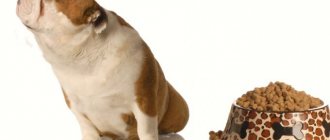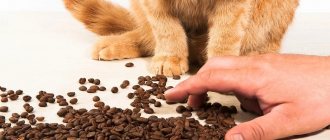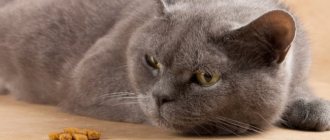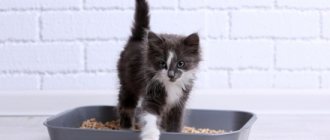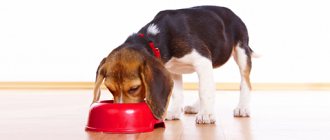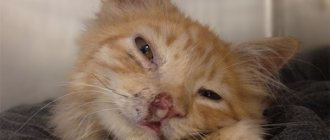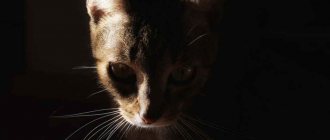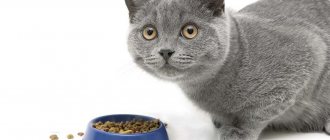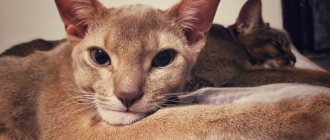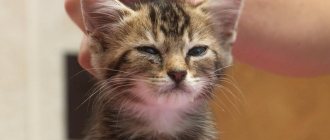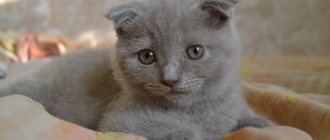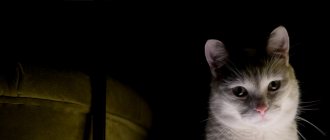There may be several reasons for decreased appetite in cats:
- physiological, related to the natural functioning of the body;
- pathological (medical) related to health status;
- reasons related to feed quality;
- reasons related to the behavior of the owners.
Let's talk in more detail about each group.
Physiological causes of decreased appetite in cats
Cats are characterized by instability of appetite, this is due to the fact that they are predators. In their natural habitat, cats do not have the opportunity to receive food in the same amount every day. Today she was lucky to catch three mice and one bird, and tomorrow only one mouse. For our pets, food is always available in the right quantity, but sometimes they can relieve their body for a day and eat a little less food than usual without harm to their health.
Another factor influencing appetite is the sexual activity of animals. Uncastrated representatives of the cat tribe, in search of love, sometimes completely forget about food, and doctors will not help here. If a pet is losing weight, and the owner does not consider it necessary to castrate it, then he must take care of the calorie content of the diet so that the animal receives the required amount of energy in small portions.
To understand that a cat has become poor at eating food precisely for a physiological reason, you need to carefully observe it throughout the day. If she continues to drink water, is active, sociable, has a clear look, and her natural functions remain normal, then there is no need to worry. If fasting continues for more than a day while feeling well, or you notice your cat is feeling unwell already on the first day, you should immediately show her to a veterinarian - the sooner treatment begins, the easier and more effective it will be.
Attention to pet health
When introducing a new food, dry type, you should be attentive to how your pet feels. You should monitor what kind of feces the animal has, and whether there are any impurities in the urine. Complications that may occur include constipation and indigestion.
If such complications are detected, you need to stop introducing new food and show the cat to a veterinarian. It will be possible to resume feeding with ready-made food no earlier than after five to six weeks.
You will need to try another brand of food, but it must be high-quality and from a reputable manufacturer.
Pathological (medical) causes of decreased appetite in cats
Just like people, cats want to eat less or not at all when they are sick. There are many medical reasons for deterioration of appetite, including general and local infectious diseases, pathologies of individual internal organs (gastrointestinal tract, urinary system and others), poisoning, foreign body stuck in the gastrointestinal tract, diseases of the teeth and gums. In fact, any ailment, from very minor to very severe, can affect the appetite of a cat.
Only a veterinarian can determine the exact cause, but the owner’s task is to help him with this. Therefore, observe the cat, note all alarming symptoms, and also analyze living conditions: the presence of vaccinations, chronic diseases; could the cat have eaten something harmful to it, does it have access to indoor plants, household chemicals. Check the cat's toys for damage, and if there is a child in the house, then check his small toys to see if anything is missing or damaged. Perhaps the pet's appetite and general condition have worsened due to the ingestion of a foreign body.
After analyzing the situation and assuming that the cat is starving for medical reasons, do not delay a visit to the veterinary clinic. Remember that after 48 hours of complete fasting, irreversible changes occur in the cat's liver: the healthy tissue of this organ begins to be replaced by fatty tissue, a condition called fatty degeneration (lipidosis) of the liver. An organ affected by lipidosis can no longer fully perform its function. The disease can be prevented by not letting your cat go hungry for too long. Therefore, you need to see a doctor as quickly as possible, establish a diagnosis, begin treatment and improve nutrition.
When force feeding is contraindicated
Animal instincts tell them a rational line of behavior, so a sick animal loses its appetite.
However, there are conditions where force feeding will actually do more harm than good. These are:
- Poisoning. In this case, actions are taken aimed at increasing the removal of the toxic substance from the body (artificially inducing vomiting, giving a cleansing enema, giving a laxative, intravenous infusions) and slowing down its absorption into the blood.
- Shock after injury. Pain and severe stress contribute to a sharp shift in metabolism and inappropriate behavior. As first aid, urgent measures are required to stop bleeding, fix the injured part of the body, as well as administer sedatives and cardiac drugs.
- Condition after anesthesia and surgery. Disorientation in space, dullness of sensitivity and disruption of muscle function lead to the loss of habitual behavioral reactions. Depending on the specifics of the surgical intervention, fasting is prescribed for 24-78 hours, and only after complete recovery from anesthesia and stabilization of the condition, dietary feeding with a gradual expansion of the diet is indicated.
- Acute gastrointestinal infection of a bacterial or viral nature. In this case, it is necessary to take emergency measures to relieve vomiting, diarrhea and general intoxication by introducing antibiotics, immunostimulants, sorbents, antispasmodics and detoxification drugs into the body.
- An attack of acute pancreatitis. For 2-3 days, the sick animal is shown fasting with intravenous administration of medicinal solutions, and only subsequently – fractional feeding in small portions.
Dehydration is much more dangerous than starvation, so drinking enough fluid or (in severe cases) intravenous infusion of special solutions that restore water-salt balance is a priority in all pathological conditions.
Food quality as a cause of decreased appetite in cats
Sometimes it happens that a cat’s appetite worsens due to a change in the quality of food. The cat feels well, does not show symptoms of the disease or they have been excluded by the veterinarian, but the appetite is still reduced; the pet eats, but as if with reluctance, perhaps even asks for other food. In this case, you need to pay attention to the food that the cat eats.
First, check the expiration dates on the packaging and make sure that the food is not expired. Also analyze the storage conditions - if they are violated, the food may lose its taste and even deteriorate. It must be stored in a cool place, without access to light and air, in a tightly closed container so that it does not erode.
Re-read the ingredients on the food package and try to determine if it has changed. You can use the manufacturer’s websites or online pet stores to compare the information on them with the composition on the packaging. It happens that the manufacturer changes the formula of the food, adds new ingredients to the composition or excludes something from it, reduces or increases the amount of any ingredient - cats can react to such innovations, including with a decreased appetite.
It is also important to check the organoleptic properties of the food (smell, taste, color, shape of granules). If they are not the same as the product in the previous pack or are very different, contact the store where you made the purchase, the manufacturer or distributor and try to negotiate an exchange of food or a refund.
If your cat does not eat dry food well, you can try giving it soaked: pour a small amount of food into a bowl, add a little water to it, let it sit for a while (10-15 minutes) and offer it to the cat. Not all cats agree to eat dry food in this modified form, but there are some who like it. When feeding soaked dry food, the main thing is to follow safety rules: pour in as much food as the cat will eat at a time, and do not leave it in the bowl for a long time - in hot weather, bacteria will begin to multiply in it within half an hour, and such food will become dangerous to the cat's health.
If a cat does not eat wet food well, the algorithm of actions is the same as in the case of dry food: we check expiration dates, storage conditions, organoleptic properties, changes in composition. All these factors need to be analyzed and understood what could be the reason for the deterioration of appetite. Manufacturers usually have many different flavors in their wet food lines; you can offer your cat wet food with a different flavor and watch her appetite. But do not overdo it, so as not to develop pickiness in your pet.
To make wet food more attractive to your cat, you can warm it up to 35-40 degrees (but no more) and see if the cat's reaction to warm food changes. It is also extremely important not to leave canned food in the bowl for a long time: put in as much as the animal can eat in one meal, so that the food in the bowl does not dry out and so that pathogenic bacteria do not multiply in it.
Unsuitable cookware
Cats are very clean animals, so they can be capricious when it comes to food if the “dining room” does not meet their requirements. Your pet may refuse food if:
- Food is served from a plastic bowl. As you know, plastic has a very unpleasant chemical smell, clearly distinguishable by the delicate animal sense of smell. In addition, plastic can react chemically with food ingredients. In connection with the above, it is recommended to buy metal or porcelain bowls for pets.
- The plate is poorly washed or contains dried remnants of the previous dinner. Animal hygiene rules should not be blatantly ignored.
- Cat dishes are washed using household chemicals, which leave a lasting scent trail. Immediately after eating, it is enough to rinse the bowl under running warm water.
- The food bowl is placed in an inappropriate place, such as close to a tray of sand or running water. Cats instinctively separate the “dining room” and the “toilet”, taking care of the cleanliness of food and water.
- The food container is excessively narrow and deep, and therefore has an unpleasant effect on the cat’s whiskers. It has been proven that the whiskers of animals perform the function of touch, “feeling” the surrounding space. They allow the cat not to make a mistake with the diameter of the hole through which the animal can crawl. If the sensitive “antennas” rest against a hard surface, the cat feels discomfort and immediately retreats. This is exactly what happens when your mustache touches the sides of an incorrectly selected bowl. Felinologists recommend feeding cats from a wide, flat plate.
Read the article:
- Is it possible to feed a kitten only wet food?
- how and when to switch a kitten to dry food;
- What is the difference between kitten food and adult food?
Owner behavior as a cause of deterioration in appetite in cats
Someone may be surprised by this formulation of the question, but sometimes a deterioration in appetite in cats or pickiness in food is a consequence of the behavior of the owners. If, at the first request of a cat, they change the type or taste of food, at the first refusal of dry food they offer wet food, if they buy food with a questionable or inconsistent composition, the likelihood of whims increases. Animals begin to manipulate their owners in order to get what they want.
If the cat feels well and the quality of the food is fine, do not rush to make any changes to the diet on the first day, watch for purring. If the appetite remains poor, you can, of course, offer your cat food with a different flavor, but do not buy the entire pet store trying to find the right one, so as not to turn your pet into a picky eater.
Many owners, when their pet has a poor appetite, act on the principle of “knocking out a wedge with a wedge”, do not feed the cats for several days in a row and wait until they are so hungry that they eat what they should eat, in the opinion of the owners. There is a common expression that no one has ever died with a full bowl, but here it is important not to go to extremes. You can let your cat starve not as a punishment, but understanding its possible need for temporary fasting, but, as indicated in the section on medical reasons, do not allow your pet to starve for more than a day, and certainly do not contribute to this with your actions, do not deprive the cat of food for a long time in to awaken appetite.
Another simple, but not always obvious reason for poor appetite in cats can be banal overfeeding. The cat is full, so it doesn’t eat, and the owner thinks that the poor thing is starving and refuses food. Determine the daily amount of food required for your pet, pour food into the bowl not by eye, but according to the norm, and monitor how much the cat eats.
If the daily amount of food is not completely eaten, determine how much the cat is not eating; the amount of uneaten food within 20% of the daily norm is not a reason to panic. When a cat eats much less than it should normally, this is a reason to analyze all the above factors and take appropriate actions.
The kitten does not eat dry food. What to do?
Also, you should not buy food right away at a high price. After all, that’s not the point here at all.
If your pet has stopped eating food that he previously consumed with pleasure, then perhaps he has simply become bored with it. Have you tried to eat the same thing day after day? So your cat gets tired of it. Give him as many different foods as possible. You can combine dry food with wet food, and from time to time even pamper your pet with meat or fish.
